Words by Ellie May and Ben Williams, ExeterMarine Undergraduate Students
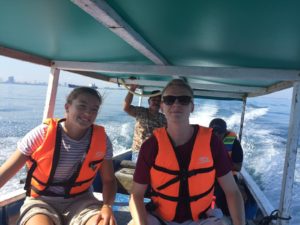
Hi there, this is Ellie May and Ben Williams giving you an update on our current trip to the Indonesian island of Sulawesi to assist Tim Gordon and Lucille Chapius in looking at the soundscapes of healthy and degraded reefs. We are currently based in the city of Makassar, where we take one of MARS symbioscience’s boat out to the islands of Bontasua and Badi to measure the acoustic complexity, richness and invertebrate snap rates of different spots around the reef. Our first day out on the islands consisted of observing and understanding the scale of restoration provided by MARS via their spider systems, in which they attach fragments of healthy reef colonies to a metal spider structure in order to promote growth in degraded areas. Our interest is understanding whether adult fish respond to the soundscapes of different reefs, and whether playing recordings of healthy soundscapes will increase not only the abundance of fish but also their rate of grazing.
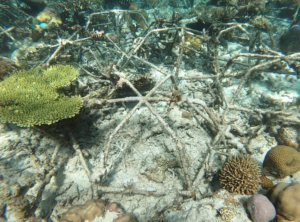
|
The spider structures used by MARS to promote coral growth. |
A typical dive day consists of being up at 7.30am to prepare our equipment and make any final adjustments before we head out to the islands at 9am. A member of the MARS team will take us to the relevant reef spot, where we deploy hydrophones to sample the baseline of the reef at various times of the day. GoPro’s are set up adjacent to the hydrophones in order to test the quality of sound they record in comparison to the hydrophones. Both Ben and I have our own side projects we are working on throughout the duration of our time here. I’m trying to prove that GoPro’s can be just as useful as hydrophones in recording reef soundscapes, which then allows any individual with access to a GoPro and free coding applications to discriminate between key components of sound, massively increasing the data sets researchers can use to measure reef health.
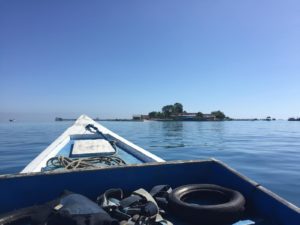
|
Our daily commute! |
During our first week, our time was split between days in the water and daily trips to the local hardware stores in order to find extra bits of equipment we needed, and safe to say we had to be pretty inventive! However, as the days pass, we’re all getting into the swing of things and learning which tasks need prioritising and where we individually fit in to the project. During our days in the water we are constantly moving between locations to record as much as possible, as well as setting up quadrats to measure fish grazing rate in response to healthy reef sound played through our underwater speaker.
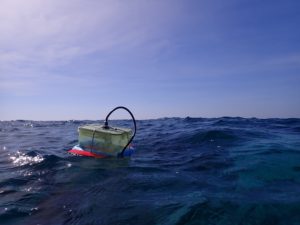
|
Part of our Speaker system that needs to stay dry! |
We usually return to Makassar’s port by 5pm, cram all our equipment into a ‘Grab’ taxi and head back to our accommodation for a debrief and evening plan. Luckily as food is so cheap we tend to go out for dinner every night, and try to sample a mix of local Indonesian food as well as a few more Western cuisines. Gado-Gado is our favourite local dish and we have a tally of how many our team can eat within the approximate month we are all staying here, as this is the only vegetarian Indonesian dish we have found as of yet!
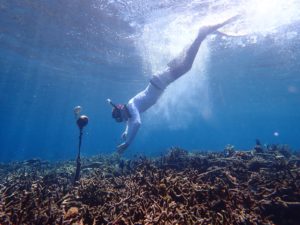
|
Ben setting up our hydrophone and GoPro system. |
After supper and a debrief we get on with preparing everything for the next day in the field, whether that be making slight adjustments to the equipment to decrease set up time or cutting and editing our audio recordings to make the data analysis in the future a lot less time consuming. We tend to get relatively early nights here as everyone is usually shattered after a long day that is both mentally and physically taxing! Often in the evenings Ben and I reflect on how truly privileged we are to be able to learn about bioacoustics on such beautiful and diverse reefs, and be able to have a first-hand insight into the incredible work MARS are doing on coral restoration. To be able to see both the logistical planning and fieldwork skills it takes to organise and run such a project is amazing, especially as a current undergraduate. Observing the differences between the restored and untouched reefs really consolidates how important restoration projects are, and hopefully there is a much wider community finally realising that big changes are needed in order to save the biodiversity of our reefs.
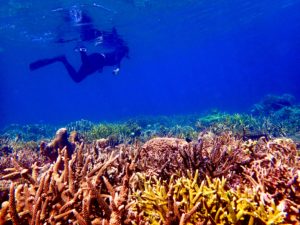
#ExeterMarine is an interdisciplinary group of marine related researchers with capabilities across the scientific, biological, medical, engineering, humanities and social science fields.
Find us on: Facebook : Twitter : Instagram : LinkedIn
If you are interested in working with our researchers or students, contact Michael Hanley or visit our website!
